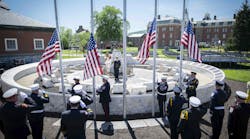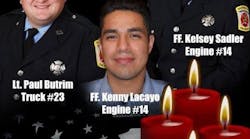Fire departments in South Florida, whose combined population is estimated at 5.2 million residents, have partnered with the University of Miami School of Medicine’s Sylvester Cancer Center to examine firefighter cancer risk and exposure. These efforts were made possible largely by efforts undertaken by the Florida Professional Firefighters and the Florida Legislature that ear marked $1 million to further examine and understand the issue of fire service cancer exposure. This efforts aims to build on the work done by the National Institution of Occupational Health and Safety (NIOSH) study that examined nearly 35,000 firefighters in Philadelphia, Chicago and San Francisco and demonstrated an elevated risk to firefighters of certain types of cancers from occupational exposure.
The University of Miami research team among other elements of their research have conducted ride alongs, station visits and focus groups to better understand the environmental factors that firefighters endure.
In particular, among other cancers the University of Miami is reviewing colorectal cancer and its prevalence among firefighters and when screenings should be recommend for firefighters. For the general population, lifetime risk is 1 in 20, or 5% and was the third leading cause of cancer deaths nationally. In 2015 alone it is estimated some 93,090 new cases of colon cancer and 39,610 new cases of rectal cancer will be diagnosed.
The researchers from University of Miami will ask firefighters from the metropolitan departments to volunteer if they are male or female and over age 40--as opposed to current general screening recommendation of age 50--and have no exclusion criteria to consent to self-administered test swab kits sent confidentially to their homes.
Similarly, for women firefighters, University of Miami researchers will seek volunteer participants to be screened and consent to self administered test swab kits. This year cervical cancer is estimated to have nearly 13,000 newly diagnosed cases, of which over 4,000 will not survive, according to statistics from the American Cancer Center.
Dual benefits make this an ideal win-win where we gather more research to focus prevention and early detection efforts within the fire service and a dual benefit that participating firefighters get screening at no cost for cancer and referrals for treatment where indicated.
This is another excellent area for our research community to partner with fire services to utilize science and data to assist us in better protecting our firefighters and their communities.
More Firefighter Cancer Resources
- Webcast: Cancer Prevention - PPE Tips and Tactics
- White Paper Addresses Firefighter Cancer Issues
- Officials: Cancer in Fire Service is an Epidemic
- LeDuc: A Trifecta of Concern & Opportunity
- Former La. Safety Chief Makes Cancer Prevention His New Mission
- Report: Firefighters Not Heeding Warnings About Cancer
- Firefighter Cancer Support Network Reaches out to Boston






